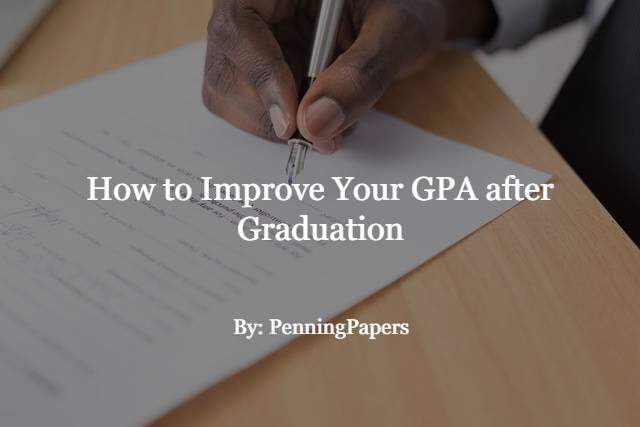If you’re trying to improve your GPA after graduation, it’s probably because you want to increase your chances of getting accepted into a college or any other post-grad program.
We’ve designed this guide to highlight all the possible routes you can take to improve your GPA after you’ve graduated. We also discuss alternative routes you can take to increase your chances of getting accepted into the program you want.
Before we get to this, though, we want to make one point very clear.
Improving your GPA after graduation is very difficult, and next to impossible. Nonetheless, there are still things you can do to increase your GPA.
This is the reason why we structured this guide the way we did: as hard as it is, we want to show you all possible methods to maximize your GPA. Then, highlight the other factors that go into the application process plus what you can do about it.
Table of Contents
- How to Improve Your GPA After Graduation
- Retaking Classes… For What it’s Worth
- Post-Bac Programs
- Crucial Note: Write About Your Upward Trend
- Other Ways to Improve Your Chances of Acceptance After Graduating
- Test Scores
- Extracurriculars and Projects
Professional College Application Help.
Contact us. We'll get to you within 24 hours.
How to Improve Your GPA After Graduation

Retaking Classes… For What it’s Worth
This method has its limits. But, it’s still an option for those who want to do everything they can to increase their GPA.
You can retake courses that you’ve already taken in the past for a higher grade. However, most students are unable to retake courses if they have passed the class. This rule depends on the jurisdiction of your institution and what they consider to be a passing or failing grade. For example, most high schools consider a C a passing grade. However, most University of California campuses consider a D letter grade a passing grade. In addition, if you’ve chosen a Pass/No Pass grading system on a University of California campus, the passing grade must be a C or higher.
The nuances heavily rely on your particular institution and what they allow. Most institutions will not allow you to retake a course if you already passed the first time.
Sometimes, you will be allowed to retake a course if you do so at another institution like a community college or another private college. However, these courses typically do not translate to the GPA of your current institution. Nonetheless, universities will see the extra effort you put in to retake failed courses and sometimes use that as a marker of your fit for the school regardless. They may even ignore the previously failed course and consider the new higher one instead.
Now for the bad news.
More often than not, retaking courses after graduation would mean that you’re not qualified for aid. This is because most financial aid systems are for students who are degree-seeking rather than finished with their program. Therefore, you’ll need to shell out money for each individual class you want to retake.
Post-Bac Programs
Another option other than retaking courses you failed is the post-bac (post-baccalaureate) method.
If you graduated with an undergrad degree, a post-bac program may provide you with the courses you need to boost your GPA before applying for higher education. This is a great method for students who have graduated with their undergrad degree and want to enter grad school. More often than not, graduate programs place a heavier emphasis on the later years of your academic career. So, adding a post-bac program and acing your courses may indicate to admissions officers that you have both the determination and the academic prowess to succeed in the field.
As with the previous method, this can still be quite costly. Depending on the program you apply for and the nuances between the lines, you may need to shell out a good chunk of change just to improve your GPA. Consider speaking with an advisor on the best methods you should take to maximize your acceptance rate in the best, most cost-efficient manner.
Crucial Note: Write About Your Upward Trend
If you intend to retake failed classes or take a post-bac program, it is absolutely crucial that you write about the upward trend in your academic performance in your personal statement.
The college admissions process for both those looking to get into undergrad and grad programs is academically fierce. Admissions officers need to know that you can handle the academic rigor of a program before having the confidence of letting you in through the door.
If you retook courses or took a post-bac program, demonstrate how your GPA increased from the beginning to now. You need to highlight this in your essays because a low GPA is going to be the first thing the admissions officers see. This is especially true for grad programs, as a high GPA and overall academic performance are generally a given for any grad student.
It’s not just about writing about the upward trend. It’s also about convincing the admissions officers that you have what it takes to handle the rigor of the institution you’re applying for. An upward trend shows that, although the road may have started bumpy, you learned how to brush yourself up into someone who can handle the work ahead. Make sure you can articulate this in the application essays thoroughly and convincingly, especially since the admissions office will be sifting through your application with a fine-tooth comb.
Lastly, it would be wise to have extra professional eyes looking at your essays. If you’re considering how to write about your academic performance increase over time, you may want to sign up for college admissions essay help. Our experts have years of experience in helping students get accepted into some of the best schools in the nation.
Other Ways to Improve Your Chances of Acceptance After Graduating

Test Scores
GPA is not the only factor that goes into the college admissions process. Test scores are also a major deciding factor.
Whether you’re applying for an undergrad program or anything beyond, test scores are going to be a great indicator of your success. Let’s say you want to get accepted into law school. If you have a lower than average GPA but high LSAT scores, you may have a chance of turning the tables and getting accepted.
Low GPAs paired with high LSAT scores indicate that a student may be capable of handling the rigor of an academic setting, but simply endured an unconventional set of circumstances that made academic performance difficult. This applies with the SAT, ACT, MCAT, GRE, and other tests as well.
Here’s an example: here at PenningPapers we worked with students from both struggling poor neighborhoods to wealthy elite institutions. In both scenarios, these students had at least one teacher who was sloppy with grading. This can be due to a mass layoff in the district or a major set of circumstances which lead teachers to not uphold the kind of work or grading they were supposed to do. (unfair grading scale, tests literally lost from the bin, etc.)
In that instance, no matter how high a students test scores are or how well it indicates they can perform in a school, it doesn’t change the fact that they’ll earn a low grade due to circumstances they cannot control. This along with other factors like health reasons, COVID-19, mental health, and familial issues can constitute a low GPA that admissions officers can understand.
In short, a high set of test scores can indicate potential to succeed at the program you apply for. It correlates very well with high GPA. But, if you have a high set of test scores and low GPA, you’ll need to explain your circumstances to the admissions office through either a separate email or in the college admissions essay section. .
Extracurriculars and Projects
Weirdly enough, it’s not uncommon for students who are performing low on both SATs and GPA to have fantastic extracurriculars and projects. We’ve worked with plenty of students, some even struggling with Autism and ADHD, who had fantastic projects they conducted related to computer science and robotics.
It’s not all that unusual to see brilliant students create fantastic works through extracurriculars and projects whilst also having a low GPA and SAT. These exceptions can at times get accepted into college; however, they typically need to apply to a wide net of schools in order to secure at least a few spots.
If you cannot perform well in your GPA or test scores, you may want to consider working on a personal extracurricular or project related to your major that will demonstrate your aptitude in the field.
Here’s an example. Let’s say you want to get accepted into an undergrad program for computer science; but, you don’t have the confidence to do so because your scores and GPA are low. You may want to consider working on an interdisciplinary project between coding and SEO online marketing. The project would include building a software or useful code that could streamline menial processes for small businesses; then, using the power of SEO and online marketing tools like Ahrefs and SemRush to market and sell your product online to potential customers.
This is a program we actually conduct with some of our aspiring Engineering and computer science students here at PenningPapers. If you want to learn more about that, you can consider speaking with us and we’ll give you more info on the scope of the work that it takes.
In conclusion, most people who want to know how to improve their GPA after graduation are going to have a hard time. There are few options for students to improve their GPA post graduation; in addition, the ones that are available are often very cost heavy due to the lack of aid. However, there are methods other than just the GPA that can help you get accepted into the schools and programs you desire. If you need help maximizing your chances of success when applying for college, don’t be afraid of scheduling a free consultation with us. Our experts have had many year of experience under their belts to help students with low scores get accepted into reach schools in the T30 rankings.

